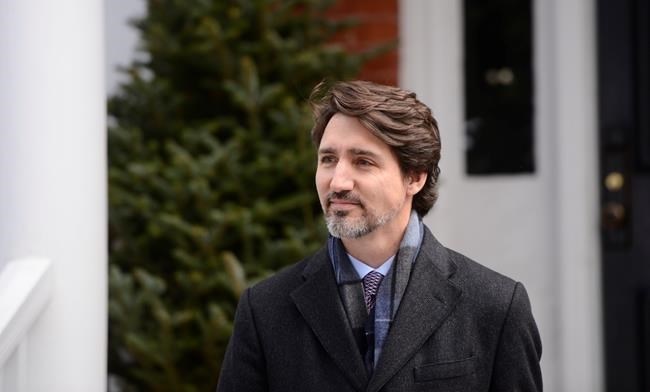
Prime Minister Justin Trudeau addresses Canadians on the COVID-19 pandemic from Rideau Cottage in Ottawa on Thursday, April 16, 2020.
Image Credit: THE CANADIAN PRESS/Sean Kilpatrick
April 16, 2020 - 6:00 PM
OTTAWA - Prime Minister Justin Trudeau and provincial and territorial leaders will speak tonight about ways to better protect those in long-term care facilities, which have been hardest hit by the COVID-19 pandemic in Canada.
Topping the agenda for the weekly first ministers' conference call is Trudeau's promise of federal support to top up the wages of personal support workers and other front-line health workers in long-term care homes.
The objective is to encourage more of those essential workers to stay on in those higher-risk jobs, and compensate them for orders in some provinces banning them from working in multiple facilities.
Roughly half of Canada's more than 1,000 deaths from COVID-19 have occurred in long-term care facilities.
Trudeau promised Wednesday that the federal government would provide financial assistance to essential workers who earn less than $2,500 a month.
But the federal government wants to co-ordinate its support with measures taken by provincial governments.
Quebec has already announced it will top up the wages of essential workers in nursing homes.
Ontario Premier Doug Ford says his province will follow suit but first he wants to see what Ottawa intends to offer.
"It's very simple. These people are working day in and day out and they need to have their wages enhanced, in my opinion," Ford said Thursday.
"So we need their support, we need the federal support. Yes, we'll come to the table as well, but I want to see what the federal government has to offer."
Ontario has issued an emergency order, starting April 22, that will prevent long-term care staff from working at multiple homes. The province has acknowledged some outbreaks in those facilities were the result of staff who work in two or three homes and inadvertently spread the virus between facilities.
Health-care workers' unions have long raised the issue, saying staff often work at multiple facilities because they're unable to get full-time positions.
At his daily briefing earlier Thursday, Trudeau said he'll be talking with premiers later in the day "about how to ensure better protection for our elders in long-term care."
"It is impossible to imagine the anguish that families and indeed our elders are going through in this situation. There is so much fear, so much uncertainty," he said.
"We need to do a better job of being there for them. The federal government is looking at ways to support the provinces as they deal with this issue. We're discussing pay top-ups for people who work in those situations because the conditions are getting more and more difficult."
Trudeau added that there are also "more regulations" that can be discussed to better protect the most vulnerable. He did not elaborate.
One measure the premiers have ruled out, however, is having the federal government invoke the never-before-used Emergencies Act, which would give it sweeping powers to override the provinces and restrict the flow of goods and people, among other things.
Saskatchewan Premier Scott Moe, chair of the premiers' council, sent Trudeau a letter Wednesday saying provincial and territorial leaders are agreed that the act is not needed. They believe provincial and federal governments already have all the powers they need to address the pandemic.
Trudeau has said he hopes the act, which he's called a "last resort," will never be needed.
This report by The Canadian Press was first published April 16, 2020.
News from © The Canadian Press, 2020